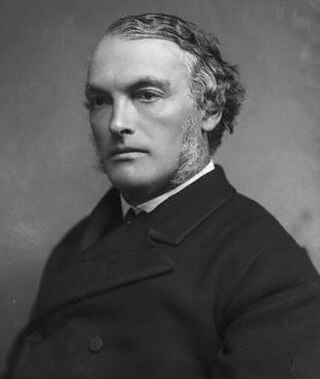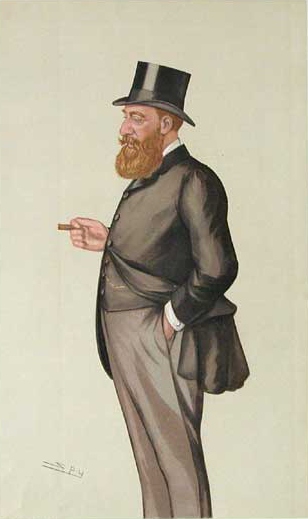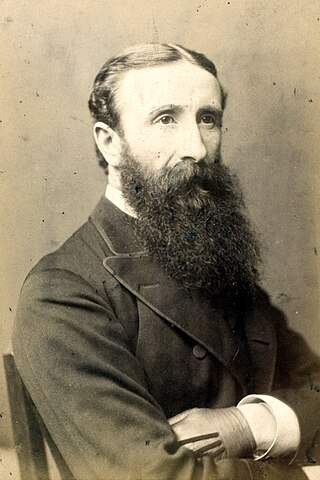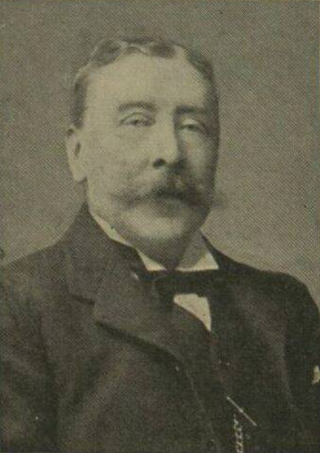Related Research Articles

Justin McCarthy was an Irish nationalist, journalist, historian, novelist and politician. He was a Member of Parliament (MP) from 1879 to 1900, taking his seat in the House of Commons of the United Kingdom of Great Britain and Ireland.

Henry James, 1st Baron James of Hereford,, known as Sir Henry James between 1873 and 1895, was an Anglo-Welsh lawyer and statesman. Initially a Liberal, he served under William Ewart Gladstone as Solicitor General in 1873 and as Attorney-General between 1873 and 1874 and 1880 and 1885. However, he broke with Gladstone over Irish Home Rule and joined the Liberal Unionists. From 1895 to 1902 he was Chancellor of the Duchy of Lancaster in the Unionist ministries of Lord Salisbury and Arthur Balfour.

The Solicitor-General for Ireland was the holder of an Irish and then United Kingdom government office. The holder was a deputy to the Attorney-General for Ireland, and advised the Crown on Irish legal matters. On rare occasions, there was also a Deputy Attorney-General, who was distinct from the Solicitor-General. At least two holders of the office, Patrick Barnewall (1534–1550) and Sir Roger Wilbraham (1586-1603), played a leading role in Government, although in Barnewall's case, this may be partly because he, was also King's Serjeant. As with the Solicitor General for England and Wales, the Solicitor-General for Ireland was usually a barrister rather than a solicitor.
Queen's County was a UK Parliament constituency in Ireland, returning two Members of Parliament from 1801 to 1885 and one from 1918 to 1922.

County Waterford was a parliamentary constituency in Ireland, represented in the British House of Commons.
Portarlington was a rotten borough and is a former United Kingdom Parliament constituency, in Ireland, returning one MP. It was an original constituency represented in Parliament when the Union of Great Britain and Ireland took effect on 1 January 1801.
William Abraham was an Irish Member of Parliament (MP) in the United Kingdom House of Commons. He was born in Limerick.
Lieutenant-Colonel John Philip Nolan was an Irish nationalist landowner and Member of Parliament (MP) in the House of Commons of the United Kingdom of Great Britain and Ireland and as member of the Irish Parliamentary Party represented County Galway (1872–1885) and Galway North (1885–1895), (1900–1906).

Colonel Sir Charles Edward Howard Vincent, known as Howard Vincent or C. E. Howard Vincent, was a British soldier, barrister, police official and Conservative Party politician who sat in the House of Commons from 1885 to 1908.

Edward Robert King-Harman was an Irish landlord and politician. He sat in the House of Commons of the United Kingdom between 1877 and 1888 as an Irish nationalist, and later Unionist, Member of Parliament.

Joseph Edward Kenny was an Irish physician, Coroner of the City of Dublin, nationalist politician and Member of Parliament (MP). In the House of Commons of the United Kingdom of Great Britain and Ireland, he was an Irish Parliamentary Party MP for South Cork from 1885 to 1892, and then a Parnellite MP for Dublin College Green from 1892 until his resignation in 1896.

Justin Huntly McCarthy was an Irish writer, historian, and nationalist politician. He was a Member of Parliament (MP) from 1884 to 1892, taking his seat in the House of Commons of the United Kingdom.

James Laurence Carew was an Irish nationalist politician and Member of Parliament (MP) in the House of Commons of the United Kingdom. A member of the Irish Parliamentary Party and later a Parnellite, he was MP for North Kildare from 1885 to 1892, for Dublin College Green from 1896–1900, and for South Meath from 1900 until he died in 1903.
Sir Joseph Neale McKenna was an Irish banker and politician whose career extended from the elite home rule politics of the mid-nineteenth century to the fall of Charles Stewart Parnell, whom he supported in later years.

Abraham Brewster PC (Ire) was an Irish judge and Lord Chancellor of Ireland.
James Anthony Lawson, PC (Ire), QC (1817–1887) was an Irish academic, lawyer and judge.

Colonel James Martin McCalmont was a British Army officer and Conservative, later Irish Unionist, politician.

Albert Grant ; Baron Grant in the nobility of Italy, was an Irish-born British company promoter and Conservative politician, unseated in 1874 for election offences.
Matthew Peter D'Arcy was an Irish Liberal politician.
References
- 1 2 M. Stenton, ed. (1976). Who's Who of British Members of Parliament: Volume I 1832-1885. Harvester Press. p. 46.
- ↑ "Wills and Bequests". Illustrated London News. 31 October 1874.
- ↑ "Friday's Gazette". Naval & Military Gazette. 3 August 1872.
- ↑ "Military Intelligence". Dublin Daily Express. 21 July 1880.
- ↑ Walker, B.M., ed. (1978). Parliamentary Election Results in Ireland, 1801-1922. Dublin: Royal Irish Academy. pp. 128, 308. ISBN 0901714127.
- ↑ "The French-Brewster Divorce Case". Morning Post. 17 December 1889.
- ↑ "The French-Brewster Divorce Case". Morning Post. 18 December 1889.
- ↑ "The French-Brewster Divorce Case". Morning Post. 19 December 1889.
- ↑ "The French-Brewster Divorce Case". Morning Post. 20 December 1889.
- ↑ "The French-Brewster Divorce Case". Morning Post. 21 December 1889.
- ↑ "The French-Brewster Divorce Case". Morning Post. 23 December 1889.
- ↑ "Deaths". Reading Mercury. 25 May 1901.